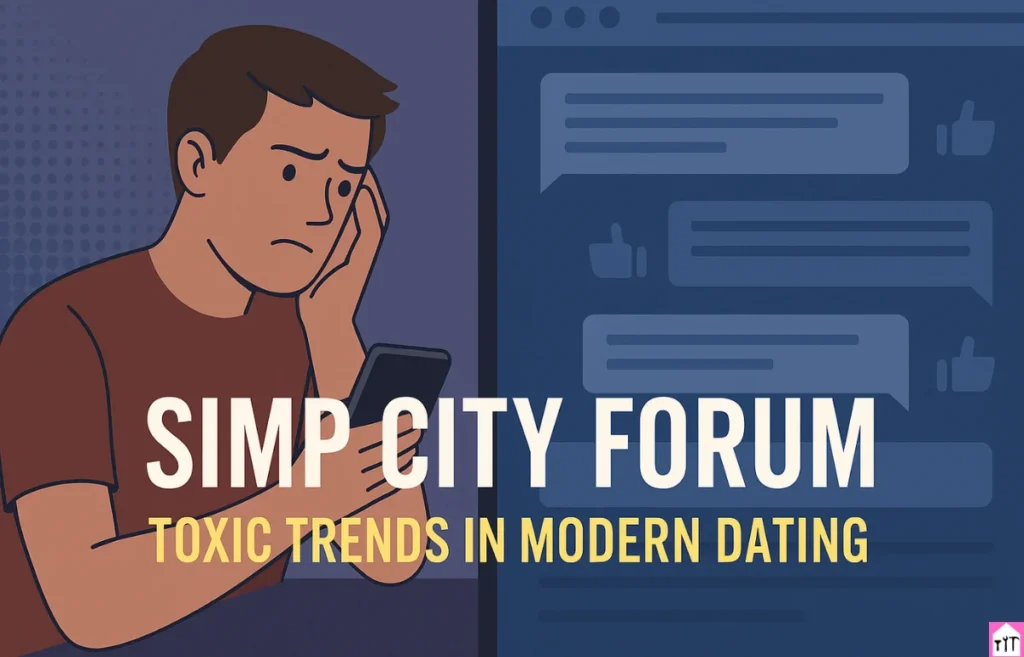
The internet has become a vast network of niche communities, and one particularly intriguing corner is the Simp City Forum. Though the name might sound satirical, the conversations within these spaces are anything but superficial. These forums serve as a digital meeting point where people—mostly men—gather to analyze dating experiences, romantic frustrations, and the behaviors commonly labeled as “simping.”
But what is a Simp City Forum really about? What are the people discussing, and what kind of culture thrives in these spaces? This article takes an honest, comprehensive look at the slang, beliefs, conversations, and potential consequences of engaging in this kind of online ecosystem.
What Is a Simp City Forum?
A Simp City Forum is typically a discussion-based online platform—sometimes a dedicated subreddit, sometimes part of a broader imageboard or private community—where users dissect romantic and social behavior through the lens of “simping.” The term “simp” has become internet shorthand for someone, usually male, who is seen as overinvesting in someone romantically or emotionally, often without receiving equal affection in return.
In these forums, users break down relationship interactions, post personal experiences, share screenshots or stories, and debate whether someone is being a “simp,” a “Chad,” or something in between.
These communities are more than just echo chambers—they’re emotional outlets, social mirrors, and, at times, hotbeds for controversial takes on gender dynamics and relationships.
Understanding the Lingo: Simps, Chads, and Betas
Like many online subcultures, the Simp City Forum has its own vocabulary. Understanding the slang is crucial to grasping the mindset and tone of the conversations happening within.
| Term | Meaning |
|---|---|
| Simp | A person, usually male, who shows excessive attention or affection to someone (usually female) without reciprocation. |
| Chad | A stereotypically attractive, confident, and desired male. Often used to highlight someone seen as successful with women. |
| Beta | Refers to a submissive, non-assertive male, often contrasted with “alpha” men. |
| Stacy | The female counterpart of a “Chad,” often depicted as conventionally attractive and high-status. |
| Red Pill | A philosophy adopted by some users who believe society hides harsh truths about dating, often criticized for promoting misogyny. |
These terms can oversimplify complex human behaviors, but they form the backbone of how relationships are interpreted within these communities.
Core Topics in a Simp City Forum
The forum doesn’t just thrive on name-calling or meme-sharing. Below are the central themes users frequently discuss:
1. Identifying Simping Behavior
Many threads start with users asking, “Was I simping?” These discussions involve real-life dating scenarios—sending flowers, writing poems, forgiving cheating, or over-texting—and whether these actions show emotional weakness or genuine care.
Some users provide genuine feedback, while others apply harsh judgment. In either case, the conversations usually revolve around emotional balance, power dynamics, and how much is “too much” in a relationship.
2. Male Vulnerability and Relationship Power
Another common thread is the perceived power imbalance in modern dating. Members often claim women have more romantic “leverage,” leading some men to overcompensate—thus “simping.” These discussions aren’t always toxic; some contributors offer thoughtful reflections on societal expectations placed on men to initiate, impress, and maintain relationships.
3. Avoiding Exploitation and Emotional Harm
Some posts highlight situations where users felt emotionally exploited—financially, sexually, or psychologically. The goal? To help others recognize red flags early and encourage self-respect.
This can create a supportive, even therapeutic, environment for men navigating heartbreak or dating confusion.
Cultural Tone: Pessimism or Protection?
The emotional tone of Simp City Forums varies widely. On the surface, some might read like cynical rants against modern dating. But dig deeper, and you’ll find posts that reveal emotional hurt, vulnerability, and a strong desire to be respected and loved.
However, a recurring issue is the generalization of women as manipulative or opportunistic. This reductive view has drawn criticism from mental health experts and sociologists.
“The language used in many of these forums reinforces a black-and-white, adversarial view of relationships that isn’t emotionally healthy,” says Dr. Lucia Chowdhury, a licensed relationship therapist. “While the pain is real, the conclusions often miss the broader picture.”
(Source: Interview with Dr. Lucia Chowdhury, Clinical Therapist, published on PsychologyToday.com, June 2024)
The Psychological Risks of Echo Chambers
While it’s easy to dismiss these communities as immature or angry, the emotional toll on participants can be serious:
Confirmation bias: Reading similar viewpoints reinforces negative beliefs about relationships.
Mistrust of healthy connections: Constant exposure to stories of betrayal can create emotional numbness.
Misogyny normalization: Repeated exposure to sexist language can desensitize users and affect real-world interactions.
Discouragement from growth: Overuse of rigid labels like “simp” or “beta” may discourage emotional learning.
It’s important to note that not all users contribute to or condone harmful behavior, but the structure of the forum allows for both helpful support and damaging rhetoric.
Alternatives to the Simp City Mentality
There’s a clear emotional need being served here: men want a place to talk about their dating struggles, fears, and confusion. But the solution isn’t always more analysis—it’s balance.
Therapy and counseling: Talking to a professional about heartbreak, trauma, or relationship confusion can bring clarity.
Educational content: Books like Attached by Amir Levine and The Social Animal by David Brooks offer healthy insights into human connection.
Peer mentorship: Some men’s groups, like The Mankind Project or Evryman, focus on emotional literacy without promoting toxic masculinity.
As psychologist Esther Perel notes, “We are in a cultural moment where men are looking for emotional guidance—but many are getting that guidance from the wrong places.”
(Source: Esther Perel, interview with NPR, 2023)
Conclusion: Proceed with Caution and Curiosity
The Simp City Forum is a fascinating reflection of modern masculinity, internet culture, and romantic anxiety. It’s a space where people seek clarity, connection, and community, but often end up entangled in cynicism or rigid gender narratives.
If you find yourself browsing such forums, stay critical. Learn from the shared experiences, but don’t take every post as gospel truth. Romantic relationships are nuanced, and human beings don’t fit into boxes labeled “simp” or “Chad.”
Next Step: If you’re struggling with relationships or self-worth, consider talking to a therapist or joining a moderated, non-toxic support group. Healing begins when judgment ends.
FAQs about Simp City Forums
1. Are Simp City Forums only for men?
While the majority of participants are men, anyone can join or observe. However, the language and tone may not always be welcoming to all genders.
2. Is simping always a bad thing?
Not necessarily. Caring deeply for someone is not inherently negative. It becomes problematic when boundaries are ignored, or self-respect is compromised.
3. Do these forums promote misogyny?
Some discussions do veer into sexist territory, though not all participants share those views. The tone depends heavily on the moderation and user base.
4. Can reading Simp City Forum posts harm my view of relationships?
If consumed without critical thinking, these forums can distort your perception of healthy dating. It’s wise to balance forum insights with expert perspectives.
5. Are there positive alternatives to these forums?
Yes. Supportive men’s groups, relationship podcasts, or professional counseling offer safer, more constructive spaces to discuss emotional issues.
Disclaimer: This article examines the “Simp City Forum” and its culture. The views shared do not represent the author’s personal beliefs. Some content may contain sensitive or controversial language. Readers are advised to engage with the material thoughtfully and seek broader perspectives on relationships.
